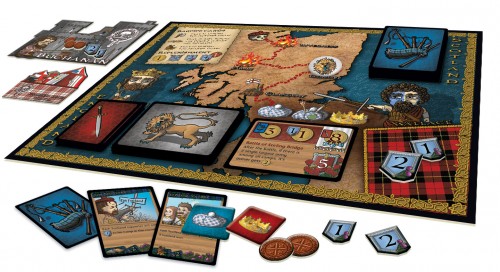Welcome to Purple Pawn, covering games played around the world by billions of people every day.
If I described Moroz Publishing’s Swords and Bagpipes to you as a board game about the First War of Scottish independence, there’s a good chance you’d immediately think “war game”. That’s certainly where my mind went when I first heard about it. As it turns out, though, Swords and Bagpipes is really a game of deduction and bluffing, albeit nicely integrated in to an historical setting.
Each round, the players, representing noble houses of Scotland, are asked to choose a side in the current battle—either to ally with England or stand for Scottish independence. Before that, however, they have an opportunity to collect taxes or recruit and mobilize soldiers. Then after the players have seen what their fellow noblemen are doing and considered the potential rewards associated with choosing either side on that round, they select and reveal choice tokens simultaneously. The players who supported independence earn more gold if Scotland wins, while the players who supported England are paid the same bribe no matter the result, except that they have to split it.
You see, the Scottish nobles in this game care mostly about gold. Assuming Scotland holds out against England (that is, suffers fewer than four defeats), the winner is the player with the most money. On the other hand, if the troops of England’s King Edward have advanced far enough (four or more victories), the winner is the player with the fewest number of daggers. Every time a player sides with England, they draw a card with 1-3 daggers. Thus by the end of the game, everyone is likely to have a few daggers and the question becomes either who made the most money off the war or who was the lesser traitor.
In general, I like this game and hope to play it more. It’s not what one expects in a game tied to specific historical events. Yet it fits well. And the need to choose sides while trying to guess which sides the other players will take makes for an engaging and sometimes tense game.
Two things about Swords and Bagpipes do bother me a little—as in enough to mention but not enough to dissuade me from playing again.
First is the artwork. I do not care for the cartoonish big-headed characters featured on the board, box, and cards. It’s a style that isn’t a good fit for a serious historically-based board game.
Second is a portion of the bagpipe cards. Bagpipe cards represent special actions or bonuses that add a little variety to the game. They’re granted to players who sided with independence on a turn when Scotland wins. And overall, they’re a fine additions that spice up the game a bit. However, presumably to balance the value of the various cards, some can be held and played a second time. It works, I guess, yet the approach feels a little clumsy or inelegant.
Swords and Bagpipes is up on Kickstarter, already funded with 20 days to go. A copy of the game can be had for a pledge of $32 plus shipping.
A complimentary prototype copy of Swords and Bagpipes was provided by Moroz Publishing for review.
CORRECTION: The game ends immediately when the English win four battles.
No Comments
Sorry, the comment form is closed at this time.
Trending
- Massdrop.com
- Oh the Irony—Illuminati Card Game Continues to Inspire Conspiracy Theorists
- Home
- Footprints, an Educational Ecology Game
- USPS Adds Board Game Flat Rate Box
- Baila, the Estonian Drinking Card Game
- Crystal Caste Wins Dice Patent Suit Against Hasbro
- Mirror Game, Red and Blue
- Are Board Games Dangerous?
- The Truth About Dominoes On Sunday in Alabama
Archives
Most Popular Articles
- Oh the Irony—Illuminati Card Game Continues to Inspire Conspiracy Theorists
- The 20 Most Valuable Vintage Board Games
- The Truth About Dominoes On Sunday in Alabama
- Sequence Game, and Variants
- USPS Adds Board Game Flat Rate Box
- Baila, the Estonian Drinking Card Game
- The 13 Most Popular Dice Games
- Are Board Games Dangerous?
- Guess Who? The Naked Version
- What Happened to the Jewel Royale Chess Set?
Recent Posts
- Toy Fair 2019—Breaking Games
- Talisman Kingdom Hearts Edition
- Toy Fair 2019—Winning Moves
- Toy Fair 2019—Games Workshop
- Toy Fair 2019—Star Wars Lightsaber Academy
- Toy Fair 2019—Stranger Things Games
- Toy Fair 2019—HABA
- Licensing Roundup
- Game Bandit
- 2018 A Difficult Year For Hasbro But Not For D&D Or MtG
Recent Comments
- on Toy Fair 2019—Winning Moves
- on Game Bandit
- on Second Look—Dungeons & Dragons Waterdeep Dragon Heist
- on Crowdfunding Highlights
- on Beyblade SlingShock
- on Game Bandit
- on Game Bandit
- on Watch This Game!, the Board Game Review Board Game
- on Second Look—Vampire: The Masquerade 5th Edition
- on Palladium Books Loses Robotech IP License, Cancels Five-Year-Overdue Robotech RPG Tactics Kickstarter





